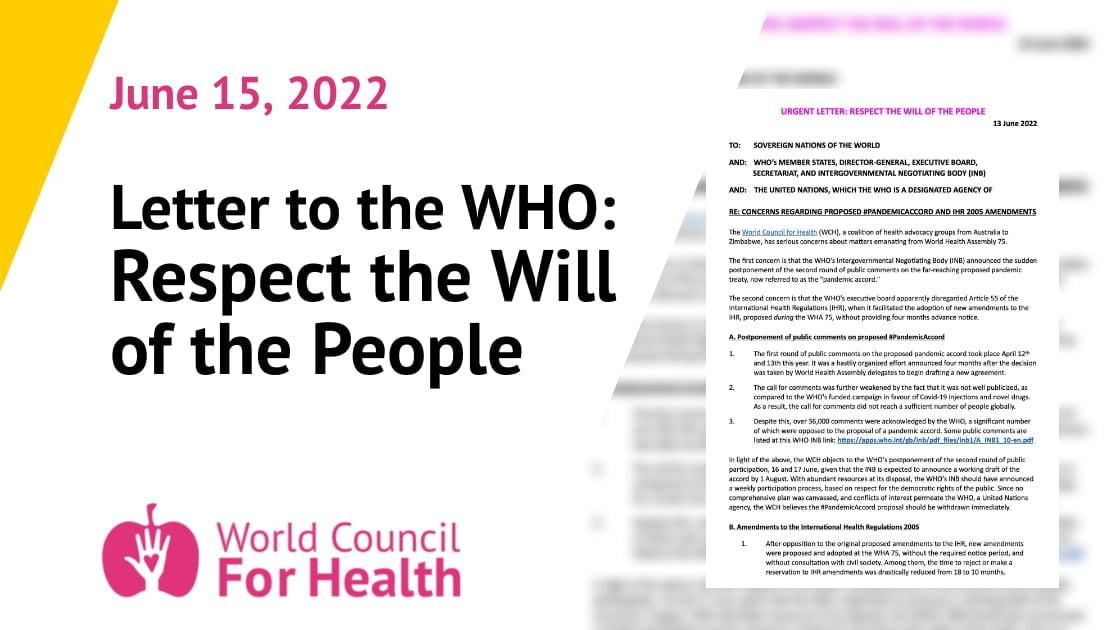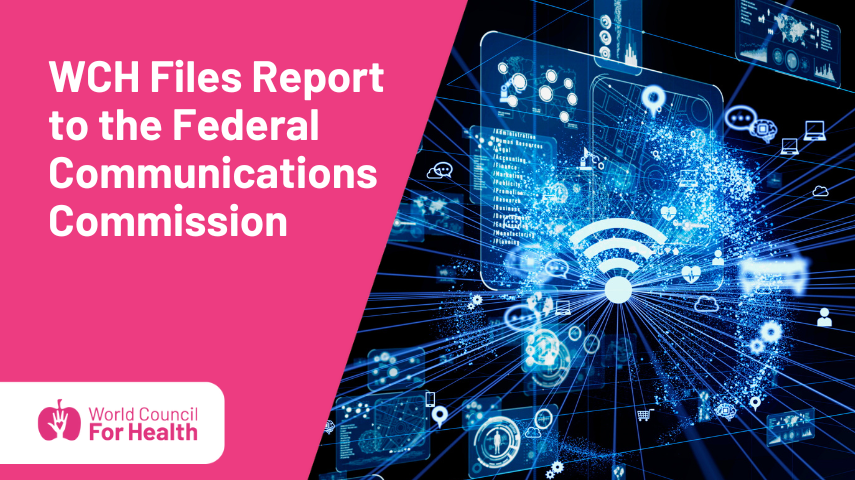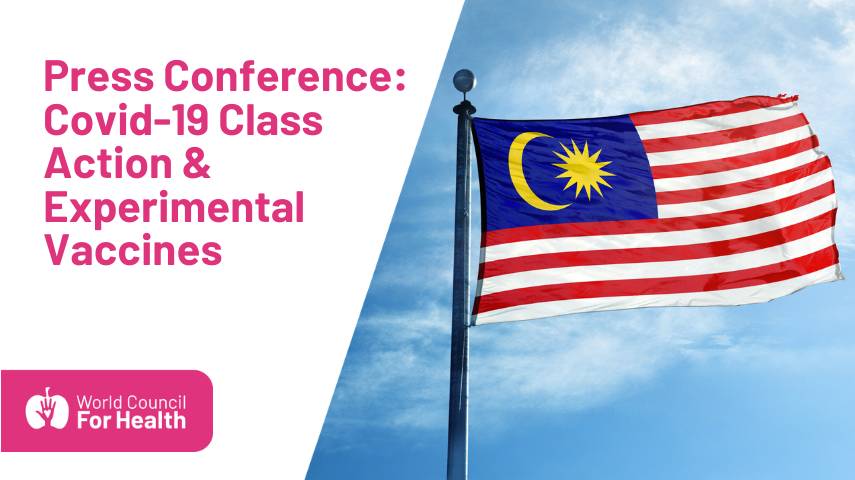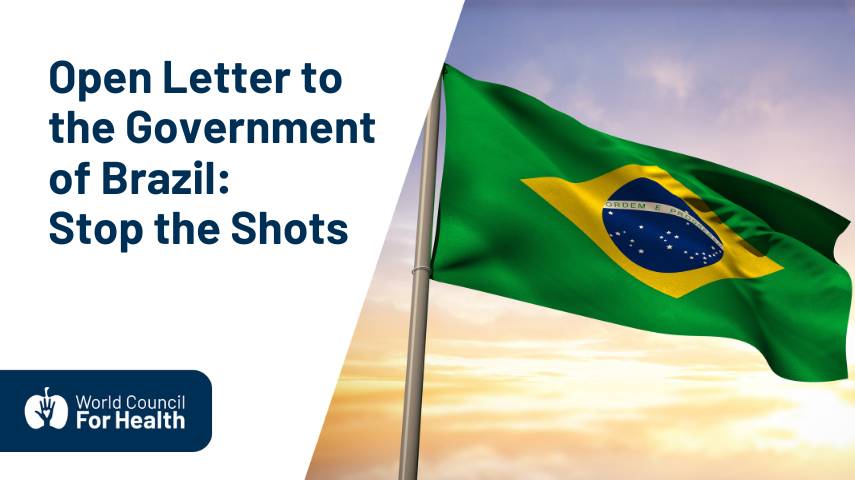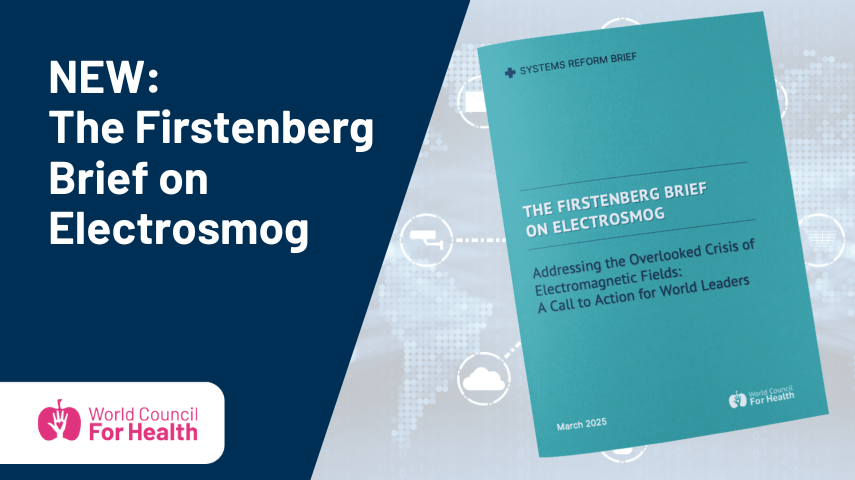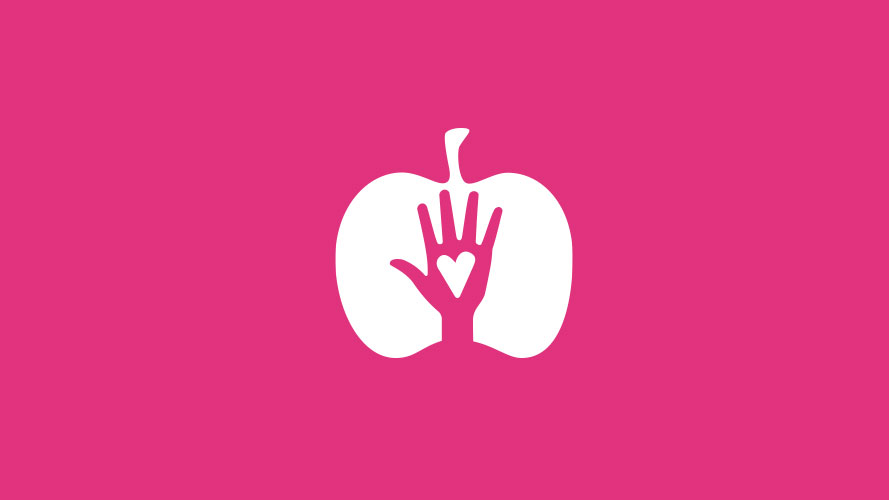The following is a letter that was sent by the World Council for Health to World Health Organization contacts (listed in Part C) directly involved in drafting the WHO’s proposed pandemic treaty (now called ‘pandemic accord’). The letter was prepared by the WCH Law and Activism Committee and addresses two serious concerns:
- The postponement of the second round of public comments on the proposed pandemic treaty previously scheduled for June 16 and 17
- The violation of Article 55 of the International Health Regulations (IHR)
URGENT LETTER: RESPECT THE WILL OF THE PEOPLE
TO: SOVEREIGN NATIONS OF THE WORLD
AND: WHO’s MEMBER STATES, DIRECTOR-GENERAL, EXECUTIVE BOARD SECRETARIAT, AND INTERGOVERNMENTAL NEGOTIATING BODY (INB)
AND: THE UNITED NATIONS, WHICH THE WHO IS A DESIGNATED AGENCY OF
RE: CONCERNS REGARDING PROPOSED #PANDEMICACCORD AND IHR 2005 AMENDMENTS
15 June 2022
The World Council for Health (WCH), a coalition of health advocacy groups from Australia to Zimbabwe, has serious concerns about matters emanating from World Health Assembly 75.
The first concern is that the WHO’s Intergovernmental Negotiating Body (INB) announced the sudden postponement of the second round of public comments on the far-reaching proposed pandemic treaty, now referred to as the “pandemic accord.”
The second concern is that the WHO’s executive board apparently disregarded Article 55 of the International Health Regulations (IHR), when it facilitated the adoption of new amendments to the IHR, proposed during the WHA 75, without providing four months advance notice.
A. Postponement of public comments on proposed #PandemicAccord
- The first round of public comments on the proposed pandemic accord took place April 12th and 13th this year. It was a hastily organized effort announced four months after the decision was taken by World Health Assembly delegates to begin drafting a new agreement.
- The call for comments was further weakened by the fact that it was not well publicized, as compared to the WHO’s funded campaign in favour of Covid-19 injections and novel drugs. As a result, the call for comments did not reach a sufficient number of people globally.
- Despite this, over 36,000 comments were acknowledged by the WHO, a significant number of which were opposed to the proposal of a pandemic accord. Some public comments are listed at this WHO INB link: https://apps.who.int/gb/inb/pdf_files/inb1/A_INB1_10-en.pdf
In light of the above, the WCH objects to the WHO’s postponement of the second round of public participation, 16 and 17 June, given that the INB is expected to announce a working draft of the accord by 1 August. With abundant resources at its disposal, the WHO’s INB should have announced a weekly participation process, based on respect for the democratic rights of the public. Since no comprehensive plan was canvassed, and conflicts of interest permeate the WHO, a United Nations agency, the WCH believes the #PandemicAccord proposal should be withdrawn immediately.
B. Amendments to the International Health Regulations 2005
- After opposition to the original proposed amendments to the IHR, new amendments were proposed and adopted at the WHA 75, without the required notice period, and without consultation with civil society. Among them, the time to reject or make a reservation to IHR amendments was drastically reduced from 18 to 10 months.
- Article 55 of the IHR 2005 is clear: “The text of any proposed amendments shall be communicated to all State Parties by the Director-General at least four months before the Health Assembly at which it is proposed for consideration.”
- The WHA committee chairperson announced a unanimous vote on amendments proposed during the WHA 75 in spite of the objections of countries, including African nations, to fast-tracking the process. A new IHR amendment was adopted that reduces the time for an amendment to come into effect from 24 to just 12 months.
The WCH is bound to advise countries with delegates at the World Health Assembly that the disregard for International Health Regulation article 55 is a serious matter that must be addressed. We exhort the WHO to respect the rule of law, and support the position of African delegates on credible, consensual, transparent and inclusive processes that respect sovereignty and democracy.
C. Call to action
- Health and wellbeing do not exist within a vacuum, but rather, within a landscape of law, policies and inalienable rights. It is necessary for the public to make itself heard through advocacy, so that the WHO does not unjustly exert authority over individuals and sovereign nations.
- In this spirit, the WCH also calls on the WHO to transparently clarify its position on the IHR amendments adopted at the World Health Assembly 75, and to withdraw the #PandemicAccord proposal that the INB is still drafting without civil society input: https://apps.who.int/gb/inb/pdf_files/inb1/A_INB1_11-en.pdf
The following people are in the INB and are responsible for drafting the proposed pandemic accord:
- Ms. Precious Matsoso (South Africa) CONTACT: [email protected]
- Mr. Roland Driece (the Netherlands) CONTACT: [email protected]
- Ambassador Tovar da Silva Nunes (Brazil) CONTACT: [email protected]
- Mr. Ahmed Salama Soliman (Egypt) CONTACT: [email protected]
- Mr. Kazuho Taguchi (Japan) CONTACT: [email protected]
- Dr. Viroj Tangcharoensathien (Thailand) CONTACT: [email protected]
The people relevant to the proposed #PandemicAccord and any IHR amendments include the WHO Director-General, the WHO executive board, WHO regional offices, member state delegates, presidents or prime ministers, as well as ministers of health, justice and foreign affairs.
D. Conclusion
The WCH maintains that the amendments to the IHR and the proposed pandemic accord are not necessary, reasonable or proportionate. Instead of creating bureaucracies far removed from the will of the people, communities should self-organise across all countries, to establish relevant health guidelines for addressing public health emergencies, within a culture of rights and freedoms.
This process, especially active over the last two years, is fully supported by the WCH. In collaboration with ethical and credible experts in science, medicine, law, activism and community organising, many of whom are partners at the WCH, we are confident that grass roots movements can help the people co-create a better way to promote health, personal autonomy and national sovereignty.
A better way for a better world
World Council for Health
Document drafted by: Law and Activism Committee
